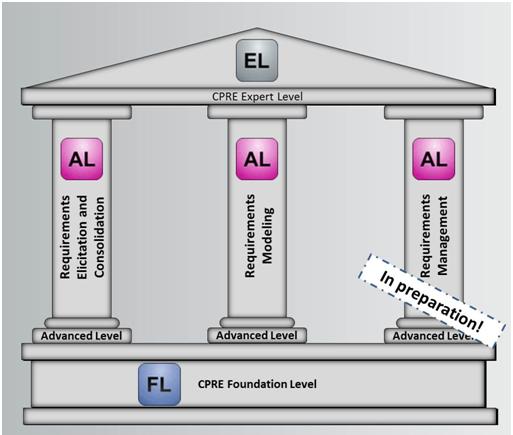Since its inception, the CPRE Foundation Level certification has evolved to become the most achieved certificate in Requirements Engineering (RE) worldwide. Right now, over 10,000 people have been certified worldwide in more than 35 countries. So what is it all about, how is it set up, what are the contents of the CPRE syllabi and how does the CPRE compare to other certifications?
 In 2006, the International Requirements Engineering Board (IREB) e.V. [IREB] was founded by renowned Requirements Engineering representatives from business, consulting, training, research and science. It is the clear intention of IREB to improve the knowledge in RE and its application and to create an international accepted basis for communication in this field. To achieve this, the IREB decided to provide the Foundation Level syllabus on a knowledge level of an advanced beginner according to the Dreyfus model of skill acquisition [Dreyfus]. This decision has been drawn in order to reach as many professionals in the community as possible and not only the already highly qualified ones. The latter may aim for the CPRE Advanced Level modules which offer sound knowledge in specific fields of Requirements Engineering.
In 2006, the International Requirements Engineering Board (IREB) e.V. [IREB] was founded by renowned Requirements Engineering representatives from business, consulting, training, research and science. It is the clear intention of IREB to improve the knowledge in RE and its application and to create an international accepted basis for communication in this field. To achieve this, the IREB decided to provide the Foundation Level syllabus on a knowledge level of an advanced beginner according to the Dreyfus model of skill acquisition [Dreyfus]. This decision has been drawn in order to reach as many professionals in the community as possible and not only the already highly qualified ones. The latter may aim for the CPRE Advanced Level modules which offer sound knowledge in specific fields of Requirements Engineering.
Why did the IREB not just provide a body of knowledge but developed a complete certification scheme? The reason is pretty simple: Companies who recognize a certification scheme as valuable, start to invest in education in this discipline as well. Whatever notion one has of certifications, certifications are a successful instrument to create interest at organizations to invest in education. And not all people out in the community are Requirements Engineering and Business Analysis specialists, not all of them do have a university degree in Systems or Software Engineering. Many of them get involved in Requirements Engineering in a project by chance, or they move from another role into a RE role. For this audience, a high level certification scheme is worthless; they all need support on an entry level stage.
The CPRE Foundation Level syllabus
Due to the nature of a syllabus, the topics are not discussed in detail but learning objectives are defined for each of them. The official companion book to the CPRE Foundation Level Requirements Engineering Fundamentals [Pohl, Rupp] discusses all the topics in detail and can be regarded as the body of knowledge for the CPRE Foundation Level. The CPRE Foundation Level syllabus [CPRE FL] covers the most important topics of Requirements Engineering:
-
Introduction and Foundations: This section highlights the important role of RE in software and systems development. It offers definitions for the most important terms in RE and provides fundamentals of communication theory and requirements types.
-
System and System Context: How to define the considered system and its boundaries and context and how to delineate it from the irrelevant environment.
-
Requirements Elicitation: How to identify stakeholders and how to deal with them. Introduction of different types of elicitation techniques and how and in which context they should be used.
-
Requirements Documentation: Importance of requirements documentation, basic rules, structure and quality criteria for requirements documents. Introduction of different types of requirements documents and importance of a glossary.
-
Documentation of Requirements Using Natural Language: Effects of natural language and common problems when documenting requirements in prose. How to avoid these by using requirements templates.
-
Model-based Documentation of Requirements: Documenting requirements with models; different types of models and how and when to use them.
-
Requirements Validation and Negotiation: How to ensure that the documented requirements meet the predetermined quality criteria, such as correctness and agreement. Identifying conflicts between stakeholders and resolving them.
-
Requirements Management: Assigning attributes to requirements, defining views on requirements, prioritizing requirements, and tracing requirements as well as versioning requirements and managing requirement changes. This includes individual requirements as well as complete requirements documents.
-
Tool Support: Discussion of different types of tools and how to evaluate and introduce them.
At present, the Foundation Level syllabus is available in English, French, German, Polish, Portuguese (Brazil) and Spanish. Other languages (e.g. Chinese) are in preparation.
The CPRE Advanced Level syllabi
The CPRE Advanced Level [CPRE AL] consists of a set of modules which offer sound knowledge in specific fields of Requirements Engineering. Currently two modules are published. Contrary to the Foundation Level, the Advanced Level modules are only available in English and German.
Requirements Elicitation & Consolidation: Different sources of requirements are discussed along with many elicitation techniques like questioning techniques, observation techniques, creativity techniques and artifact-based techniques. Conflict resolution is supported by a variety of consolidation techniques and clear guidelines as to which situation to use which technique. Available in English and German.
Requirements Modeling: How to use models for requirements elicitation and documentation. The main focus is on modeling of information structures, functions, behavior and scenarios in Requirements Engineering. Available in German, English probably end of 2013.
Other Advanced Level modules are in preparation and will be published in 2013 and subsequently.
 The structure of the CPRE certification scheme
The structure of the CPRE certification scheme
The CPRE Glossary
The CPRE glossary complements the CPRE Foundation Level companion book Requirements Engineering Fundamentals [Pohl, Rupp 2011]. The definitions in the book and the definitions in the glossary have been aligned with each other. In the current state, 128 terms have been defined, covering the base terminology to a large extent. There are still some gaps with respect to the terminology related to processes, project management, and product management. Special terms, for example of specific techniques for requirements elicitation or conflict resolution, are also still missing. The plan is to fill these gaps incrementally in the future
The CPRE certification
IREB strictly separates the subject matter related work from training and certification – compliant to the ISO/IEC 17024:2012 standard. Contrary to other certification schemes, exams are neither conducted by the holder of the certification scheme itself (IREB) nor by the employees of a training provider. Exams are conducted by certification bodies as personally and organizationally independent organizations. This model ensures fairness and neutrality of the examinations and avoids conflicts of interests.
The exams for the Foundation Level can be taken in English, French, German, Portuguese (Brazil), Spanish and soon in Chinese. The Advanced Level exams can be taken in English and German.
There are two other important certifications which overlap in some way with the CPRE: The CCBA/CBAP from IIBA and the Certificate in Requirements Engineering from BCS. How are they related to each other?
The CCBA/CBAP and the CPRE are often regarded as competitive certifications, but if you have a close look at them they are not! First, the CPRE clearly focuses on Requirements Engineering, which is definitely very important, but only a part of the Business Analysis field; whereas the CCBA/CBAP cover the complete area of Business Analysis. Second, with its high entry criteria the CCBA/CBAP are clearly addressing the advanced professionals, whereas the CPRE Foundation Level is addressing the advanced beginner. Together with the CPRE Advanced Level modules the CPRE is offering an education path for the professionals.
The setup of the BCS Certificate in Requirements Engineering is much more comparable to the IREB CPRE. The Certificate in Requirements Engineering is part of a whole certification program of BCS and just one brick in the BCS Business Analysis Diploma. The CPRE Foundation Level and the BCS Certificate in Requirements Engineering do have an overlap of about 80%. Therefore the IREB and the BCS have signed a Memorandum of Understanding in November 2012 where it is agreed that
-
Candidates that have completed the IREB’s CPRE Foundation Level are exempt from taking the BCS Certificate in Requirements Engineering to achieve their Diploma.
-
Candidates that have completed the BCS Certificate in Requirements Engineering are exempt from taking the IREB CPRE Foundation Level to progress to the CPRE Advanced Level.
So rather than deciding between the CPRE and the other certification schemes, there is a reasonable way to follow a career path by starting with the IREB CPRE and then advancing to one of the higher qualifications.
Wrap up
With over 10.000 certified professionals, the CPRE of IREB is probably the most successful certification scheme in Requirements Engineering worldwide. The Foundation Level focusses on the advanced beginner and, together with the Advanced Level modules and the planned Expert Level, it offers a comprehensive career path for Requirements Engineers and Business Analysts. Professionals can start their qualification by achieving a CPRE Foundation Level certificate and then progress to the CPRE Advanced Level, the BCS Diploma in Business Analysis or the CCBA/CBAP.
Author: Stefan Sturm has been in the field of software and system development for 25 years. His career path covered business analyst, requirements engineer, architect, project lead to the definition of systems and development processes to create these systems. In April 2011, he was appointed as Managing Director of IREB GmbH, the operating company of IREB. In this position, he is responsible for all the numerous activities resulting from the worldwide growing success of the CPRE certificate. The author can be reached at [email protected].
Sources:
[CPRE FL]: The Certified Professional for Requirements Engineering – Foundation Level syllabus
[CPRE AL]: The Certified Professional for Requirements Engineering – Advanced Level syllabi
[Dreyfus] Stuart E.; Dreyfus, Hubert L.: A Five-Stage Model of the Mental Activities Involved in Directed Skill Acquisition (February 1980)
[IREB]: The International Requirements Engineering Board (IREB)
[Pohl, Rupp 2011] Klaus Pohl, Chris Rupp: Requirements Engineering Fundamentals, A Study Guide for the Certified Professional for Requirements Engineering Exam - Foundation Level - IREB compliant, 1st edition, Rocky Nook Inc. (April 2011), ISBN-13: 978-1933952819
Article image © burak çakmak - Fotolia.com